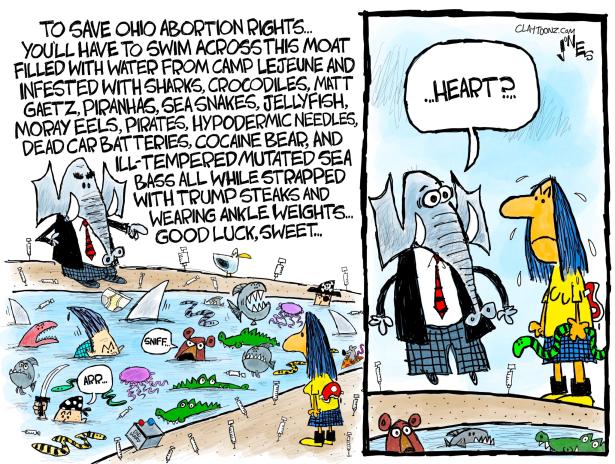- Responses to the Siege of Gaza
- Pipeline Plugged
- The Anti-Abortion Movement’s New Campaign
- Has Chick-fil-A Gone Woke?
- A Historic Climate Fight in North Carolina
- A Long Game to Undercut Democracy
- Labor Education Starts in School
- Cornel West’s Erratic Campaign
- GOP, UAW and China
- Ursula Le Guin’s Radical Utopias
Responses to the Siege of Gaza
- Why I Stand With Palestine By Judith Pasternak, The Indypendent
- Scenes From a Protest By Arielle Isack, The Baffler
- Gen Z and Gaza By Gabriella Borter and Joseph Ax, US News and World Report
- A Surge in Suppression By Dylan Saba, N+1
- Cancel Culture From the Top Down By Timothy Noah, The New Republic
- Starbucks Brings the War Home — To Its Workers By Ryan Grim, The Intercept
By Julia Conley
Common Dreams
Navigator CO2 Ventures said it was abandoning plans to build the $3.5 billion, 1,300-mile Heartland Greenway pipeline project—whose backers included investment firm BlackRock and Valero Energy—after South Dakota regulators denied a permit. Advocates credited campaigning by residents who spoke out against the company's plan to potentially use eminent domain to gain access to land.
The Anti-Abortion Movement’s New Campaign
By Jessica Valenti
Abortion, Every Day
More than a year after Roe’s demise, Americans are still furious and Republicans are still losing at the polls—but the anti-abortion movement is full steam ahead. They’re thinking bigger than ever, cultural and political backlash be damned. The activists that decimated abortion rights have quietly rolled out a new initiative to force American women to carry doomed pregnancies to term.
By Veronika Bondarenko
TheStreet
Chick-fil-A became the subject of a national firestorm when, in 2012, then-CEO Dan T. Cathy made a number of comments against LGBTQ people and some customers dug up that the chain regularly donated to Christian charities campaigning against same-sex marriage. The chain committed to fully divesting from organizations opposing same-sex marriage in 2019.
A Historic Climate Fight in North Carolina
By Rund Abdelfatah, et al.
NPR
People like Dollie Burwell had figured out a way to reach people “the old-fashioned way,” Dollie Burwell says — door to door, church to church, friend to friend, cousin to cousin. It was understood that the county being mostly Black and poor probably had a lot to do with why PCBs got dumped there, and why a landfill was now being built.
A Long Game to Undercut Democracy
By Cullen Peele
Human Rights Campaign
The Alliance Defending Freedom is classified as a hate group by the Southern Poverty Law Center. Yet many judges and lawmakers continue to welcome its influence and guidance. This guidance includes the peddling of false or misleading information to develop case law restricting the rights of LGBTQ+ people through the courts.
Labor Education Starts in School
By Sonali Kolhatkar
Z
Teaching students about the rich history of labor organizing in the U.S. can offer a solid foundation upon which to inform them about their own rights in the workplace. AB 800, which California Governor Gavin Newsom just signed into law, does precisely that: teaching younger generations about labor in a way that doesn’t reinforce capitalist values and corporate ethos.
Cornel West’s Erratic Campaign
By Calder McHugh
Politico
West thinks the Greens can’t take him where he wants to go. The Greens think West is throwing away movement politics and blowing up his own campaign to boot. With some remove, it’s easy to see the split as the latest example of the narcissism of small differences that’s plagued segments of the modern left in recent years.
By Jeff Schuhrke and Sarah Lazare
In These Times
Rather than actually supporting auto workers in their strike against billionaire CEOs at the Big Three, GOP officials are instead using the labor action to rail against electric vehicles and stoke conflict with China.
Ursula Le Guin’s Radical Utopias
By Nick Hubble
Jacobin
Only the reality of the past and the future, held within human memory and intention, makes the present real. Not only does Le Guin’s fiction symbolize the possibility of change for socialist readers, then; it also gives some idea of the sheer degree of the mental work required for us to comprehend the radical difference that would be entailed by that change.


Spread the word